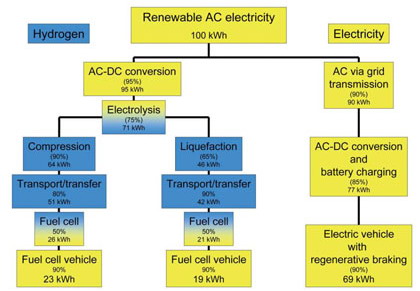abasile said:
With the cost of 200+ mile BEVs on a downward trajectory, I just don't see a strong need for H2 in passenger cars. I have no problem with H2 being an option, however, and letting consumers decide, as I agree that H2 is generally preferable to gasoline/diesel.
Yes, BEV prices are falling, but FCEV prices are falling faster - and are expected to continue to fall faster than BEV. I think that's really important as there don't appear to be any revolutionary battery developments waiting in the wings.
abasile said:
For consumers, it seems clear that infrastructure and "fuel" costs will favor BEVs over H2 for the foreseeable future. With a BEV, I can "refuel" anywhere I can get permission to use an electrical outlet, and the cost is low.
Hmmm...maybe for the already converted, and especially the already converted on the west coast. I can assure you that the consumer choice in the central and southern US is not electric - especially as about 90% of the advertising and development effort is for natural gas, not EVs.
abasile said:
Of course, H2's trump card is fast refueling, an essential selling point to some fraction of consumers.
Agreed - that's a point. There are others, however. Longer range, no range penalty when using cabin heat, and no significant range loss over time are three that are more critical. I live on the outer edge of the country's 7th largest city. The only car that can get me to my son's homeschool park day every week is a Model S. The LEAF can get me there and back the first year, but not in year number 2. Home charging is nice as long as one isn't going far from home. Sure, that'll change when there's more infrastructure, but we're not there yet for either BEVs or FCEVs.
We need a way to transition to electric transportation and replace all ICE vehicles. To do this, we need vehicles that can replace an ICE everywhere in the country - not just in the places with moderate climates. Don't get me wrong - I'm a mad fan of efficiency and have completely overhauled my life in the past 5 years to reduce my carbon footprint. But the only way I can function today with only an EV is to ignore my family, only go out for groceries, and do the rest of my shopping on Amazon. Things will have to get pretty bad on this planet for even 50% of Americans to agree that the current BEV crop is the 'best' choice.
We need more and lower priced carbon fiber; and lighter weight, more aerodynamic vehicles - that'll allow current batteries to provide longer range. Doubling battery size/mass with a corresponding price will likely reduce, not increase, BEV marketability - at least for the 'other 70%' of consumers in this country...

